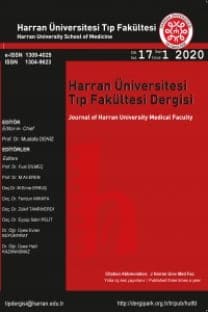Acil Serviste Dev Retroperitoneal Bir Abse'nin Değerlendirilmesi: Nadir Raslanan Bir Olgu Sunumu
Retroperitoneal Abse, Batın bigisayarlı tomografisi, AcilServis
Assessment of a Giant Retroperitoneal Abscess in Emergency Department: An Unusual Case Presentation
___
- 1.Ohara G, Kondo T, Kagohashi K, Watanabe H, Kawaguchi M, Kurishima K, et al.Retroperitoneal abscess shortly after chemotherapy for lung cancer: A case report.MolClinOncol. 2014 ;2(2):302-4
- 2.Huang SH, Lo WO, Lin CM, Hsieh TS, Wang SF, Tsai SW, Chen KC. Retroperitoneal abscess: 7-year experience of 29 cases in a tertiary care center in Taiwan. J Urol.2015; 26(3):218–21
- 3.Su CN, Hsieh DS, Sun GH, Yu DS, Fong CJ.Primary retroperitoneal abscess complicated with septic arthritis of the hip.J Chin Med Assoc. 2006;69(1):51-3.
- 4.Ioannidis O, Kakoutis E, Katsifa H, Rafail S, Chatzopoulos S, Kotronis Aet al.Streptococcus mutans: a rare cause of retroperitoneal abscess.Adv Med Sci. 2011;56(1):113-8.
- 5.Woo MY.Psoas abscess.J EmergMed. 2014;47(5):129- 30.
- 6.Li SY, Jiang JK, Chang YH, Wu TC, Yang WC, Ng YY.Recurrent retroperitoneal abscess due to perforated colonic diverticulitis in a patient with polycystic kidney disease.J Chin Med Assoc. 2009;72(3):153-5.
- 7.Shigemura K, Arakawa S, Miura T,Yasufuku T, Nakano Y, Tanaka K et al.Retroperitoneal abscess perforating into the thoracic cavity in an immunocompromised host.J Infect Chemother. 2008 ;14(4):305-7.
- 8.Amitai A, Sinert R.Necrotizing fasciitis as the clinical presentation of a retroperitoneal abscessJ Emerg Med. 2008 ;34(1):37-40.
- 9.Russo G, Lichtner M, Carnevalini M, Mascellino MT, Mengoni F, Oliva A et al.Primary retroperitoneal abscesses due to Rhodococcusequi in a patient with severe nephrotic syndrome: successful antibiotic treatment with linezolid and tigecycline.IntJ Infect Dis. 2010 ;14(6):533-5.
- 10.Nguyen CT, Tomford JW, Desai MM. Retroperitoneal cold abscess caused by mycobacteria chelonaeabscessus after percutaneous nephrolithotomy in India: strategies for detection, management, and prevention in the United States.Urology. 2009 ;73(1):209-13.
- 11.Katsuno S, Ando H, Seo T, Shinohara T, Ochiai K, Ohta M. A case of retroperitoneal abscess caused by Salmonella Oranienburg. J Pediatr Surg. 2003 ;38(11):1693-5.
- ISSN: 1304-9623
- Yayın Aralığı: Yılda 3 Sayı
- Başlangıç: 2004
- Yayıncı: Harran Üniversitesi Tıp Fakültesi Dekanlığı
Vazovagal Senkoplu Hastaların Elektrokardiyografi Ve Ekokardiyografilerinin Değerlendirilmesi
Eyyup TUSUN, Abdulselam İLTER, Feyzullah BEŞLİ
Acil Serviste Dev Retroperitoneal Bir Abse'nin Değerlendirilmesi: Nadir Raslanan Bir Olgu Sunumu
Uğur LOK, Hasan BÜYÜKASLAN, Umut GÜLAÇTI, Hacı POLAT, İrfan AYDIN
Penetrating Orbital Trauma by a Crochet Needle: A Case Report
Muhammed BATUR, Aydın YILDIZ, Tekin YAŞAR, Çağatay ÇAĞLAR
İleri Evre Perthes Hastalığında Cerrahi Tedavi Sonuçlarının Radyolojik Olarak Karşılaştırılması
Diklofenak Kullanımı Sonrası Ortaya Çıkan Toksik Epidermal Nekrolız
Osman YEŞİLBAŞ, Hasan Serdar KIHTIR, Esra ŞEVKETOĞLU
Testis Tümörü Rolünde Bir Brusella Epididimiorşiti: Olgu Sunumu
Hasan Anıl KURT, Bülent KATI, Eda GENÇALİOĞLU, Emrah DEMİRCİ, Cabir ALAN
Tığ İğnesi ile Oluşan Penetran Orbital Travma: Olgu Sunumu
Aydın YILDIZ, Çağatay ÇAĞLAR, Muhammed BATUR, Tekin YAŞAR
Yanık Hastalarında Hastane Seçiminin Önemi: 22 Olgunun Retrospektif Değerlendirilmesi
Fatin Rüştü POLAT, Güner ÇAKMAK, İlhan BALİ, Onur SAKALLI
Civa Klorid ve Kurşun Nitrat'ın Erkek Ratlarda Kardiyotoksik Etkisi
Assessment of a Giant Retroperitoneal Abscess in Emergency Department: An Unusual Case Presentation
Hasan BUYUKASLAN, Umut GÜLAÇTI, Uğur LOK, İrfan AYDIN, Hacı POLAT
